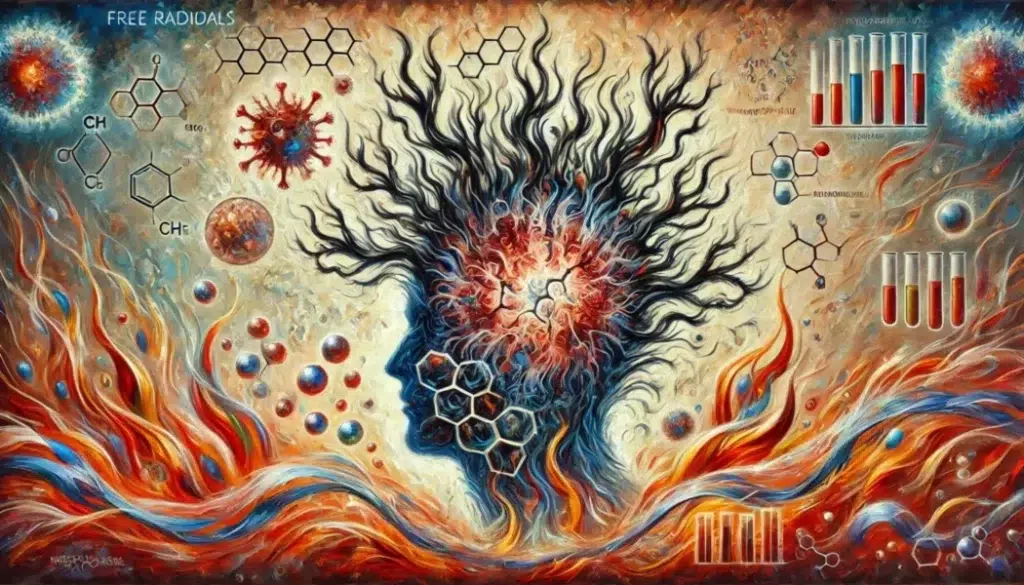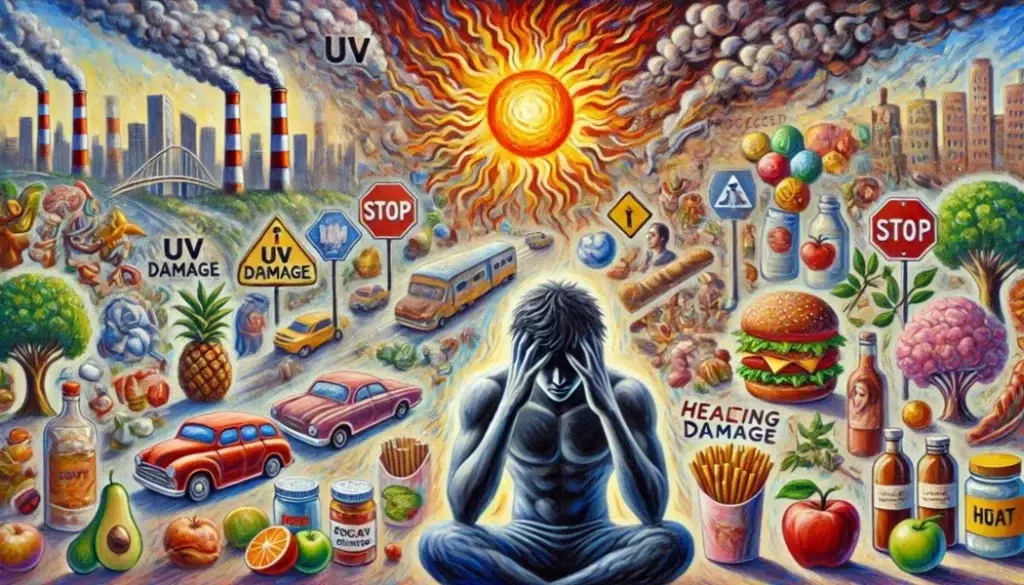🧨 Oxidative Stress Isn’t Just a Buzzword – It’s Real Hair Damage
Oxidative stress is like a sneaky thief robbing your hair of strength, shine, and vitality. Free radicals—those unstable molecules generated by pollution, UV rays, poor diet, and stress—wreak havoc on your scalp and strands. When your body lacks enough antioxidants to fight them off, oxidative stress sets in, silently breaking down the proteins that keep your hair healthy.

Have you ever noticed your hair feeling limp, dull, or more unmanageable after a week of stress, poor sleep, or fast food? That’s oxidative stress at work. It gets triggered by pollution, too much sun without protection, a lack of colorful fruits and veggies, and even ongoing mental stress. All of these crank up the free radical chaos.
Your scalp and hair follicles sit on the front lines—they face sun, wind, city air, and daily grime without a break. Over time, this exposure builds up oxidative damage that quietly undermines the health and structure of your hair.
🔍 Identifying the Visible Signs of Oxidative Hair Damage
Ever noticed more hair clogging your shower drain than usual? Or finding extra strands on your pillow each morning? Blame oxidative stress for that. When hair starts showing visible signs, like being brittle or weaker, that’s your hair’s distress signal. It’s not some high-concept mystery but real life.
We all love shiny locks that bounce with vitality. Unfortunately, oxidative stress knows how to dull them right down. Your once-vibrant strands might start looking a little tired and less elastic. If you notice your hair losing its luster or refusing to style the way it used to, it’s screaming for attention.

Graying might have been something you expected in your later years, but those annoying free radicals have a way of speeding up that timeline. If strands start turning silver well before their time, oxidative stress might be at play.
Sometimes, it’s not just about looking good—it’s about maintaining those locks. Slowed hair growth is another telltale sign that oxidative stress might be pulling the strings behind the scenes.
These changes are our hair’s way of giving us a nudge—an indicator that something’s up. By spotting these early signs, you’re in a better position to address and possibly reverse oxidative damage.
🧬 The Scientific Explanation of Free Radical Damage to Hair Follicles
Let’s get a bit sciency. Our hair is like a little fortress made up of proteins and lipids, with keratin playing a big role in keeping it strong and resilient. When free radicals come into play, they start breaking down keratin and other structural proteins. It’s like losing the building blocks that give hair its strength and form.
Oxidative stress doesn’t just mess with the structure; it leads to microinflammation in the hair follicles. Think of it as tiny fires that slowly compromise the follicle’s ability to perform at its best. This can lead to a thinning mane and, over time, hair loss.

To back it all up, a study published in the Journal of Dermatological Science highlights how oxidative stress worsens conditions like androgenetic alopecia, that common hair-loss condition many deal with. According to the findings, managing oxidative stress is key to slowing hair thinning in men and women alike.
So, what’s the takeaway? Address the root causes—literally. Managing oxidative stress not only helps maintain your hair’s structural integrity, but it might also keep more hair on your head instead of your brush.
⚠️ Uncovering Factors that Amplify Oxidative Stress on Hair
When you think of skin, you might consider sun damage, but your hair isn’t safe either. UV radiation is a sneaky culprit behind so much hair damage, accelerating oxidative stress. The sun’s rays break down proteins in the hair, leading to weaker strands and more frequent bad hair days.
Then there’s air pollution. City dwellers, this one’s especially for you. With every puff of smoke or exhaust you walk through, you’re exposing your hair to oxidative stress triggers, leaving your locks frazzled and vulnerable.
Poor dietary habits are next on the list. A diet heavy in sugar and lacking in antioxidants can set back your hair health. Antioxidants found in fruits and veggies help fight free radicals—missing out on them can leave hair lifeless.

Chronic stress is another factor. We’ve all felt how stress can mess with our bodies, but it takes a toll on our hair too. From causing strands to fall out to slowing growth, it’s best to manage stress with practices like exercise or meditation.
Smoking and alcohol don’t just affect your overall health; they impact your hair too. Both introduce more free radicals into the body, wreaking havoc on your follicles. Cutting back could help improve the quality of your hair.
Let’s not forget those styles and treatments. Heat styling, coloring, and chemical processes might make you feel like a star temporarily, but they can also damage hair in the long run. Whenever you can, give your hair a break.
To manage these stress factors, consider wearing hats outside, eating a colorful plate full of antioxidants, and giving your hair some much-deserved care and downtime. It’s all about making little changes for healthier, happier hair
🛡️ Reinforcing Hair Health Through Daily Prevention
Now that you know the enemy, let’s talk about strengthening your defenses. It all starts with your lifestyle. Load your diet with antioxidant-rich foods like berries, spinach, broccoli, and nuts. These help neutralize free radicals before they can do damage.
Supplements like vitamin C, E, biotin, and omega-3s can also help, especially if your diet needs a boost. Green tea, both as a beverage and topical extract, has powerful antioxidant properties that can support scalp health and reduce inflammation.
Don’t underestimate the power of sun protection—wearing hats, using UV-blocking sprays, and simply staying in the shade can save your strands from UV-related stress.

Equally important: managing internal stress. Mindfulness practices like yoga, meditation, and quality sleep help reduce systemic oxidative stress. When your body is at ease, your hair gets the message.
The goal isn’t perfection—it’s consistency. Daily prevention isn’t about turning your life upside down; it’s about smart, sustainable choices that support your hair’s long-term health.
Stay with us — the best is yet to come.
By following our advice, you’re doing the most you can for your hair.
Be the first to know when we publish new guides, tests, and proven strategies for stronger, healthier hair.
👉 Visit the About Me page to learn more about my journey, mission, and why helping people with hair health is so personal to me.
Want healthier, stronger hair? Discover 8 science-backed habits that protect your scalp and boost natural growth. Get your free PDF guide today!
Disclaimer: This article is for informational purposes only and is not a substitute for professional medical advice. Sensitive claims are supported with scientific references, and full product details can always be found on the official websites of the respective manufacturers or distributors.
Some links in this article are affiliate links. If you choose to make a purchase through them, I may earn a small commission at no extra cost to you — helping me keep HairGrowGenius running. Thank you for your support!

❓ FAQ: Oxidative Stress and Hair Damage
🌪️ What exactly is oxidative stress?
Oxidative stress occurs when there’s an imbalance between free radicals and antioxidants in your body. It can damage cells — including hair follicle cells — and speed up hair aging and loss.
🧑🔬 How does oxidative stress affect the scalp and hair?
It can weaken the hair follicle structure, disrupt normal hair growth cycles, cause inflammation, and make hair more prone to breakage, thinning, or premature greying.
🥦 Can diet help reduce oxidative stress?
Yes. Antioxidant-rich foods like berries, leafy greens, nuts, and green tea help neutralize free radicals. A healthy diet can protect hair and improve scalp resilience.
💊 Are there products that protect hair from oxidative stress?
Yes. Look for shampoos, serums, or supplements with antioxidants like vitamin C, vitamin E, polyphenols, or plant extracts such as rosemary, turmeric, or ginseng.
🧾 Last updated: June 2025 based on current dermatology and cellular biology research.


Leave a Reply